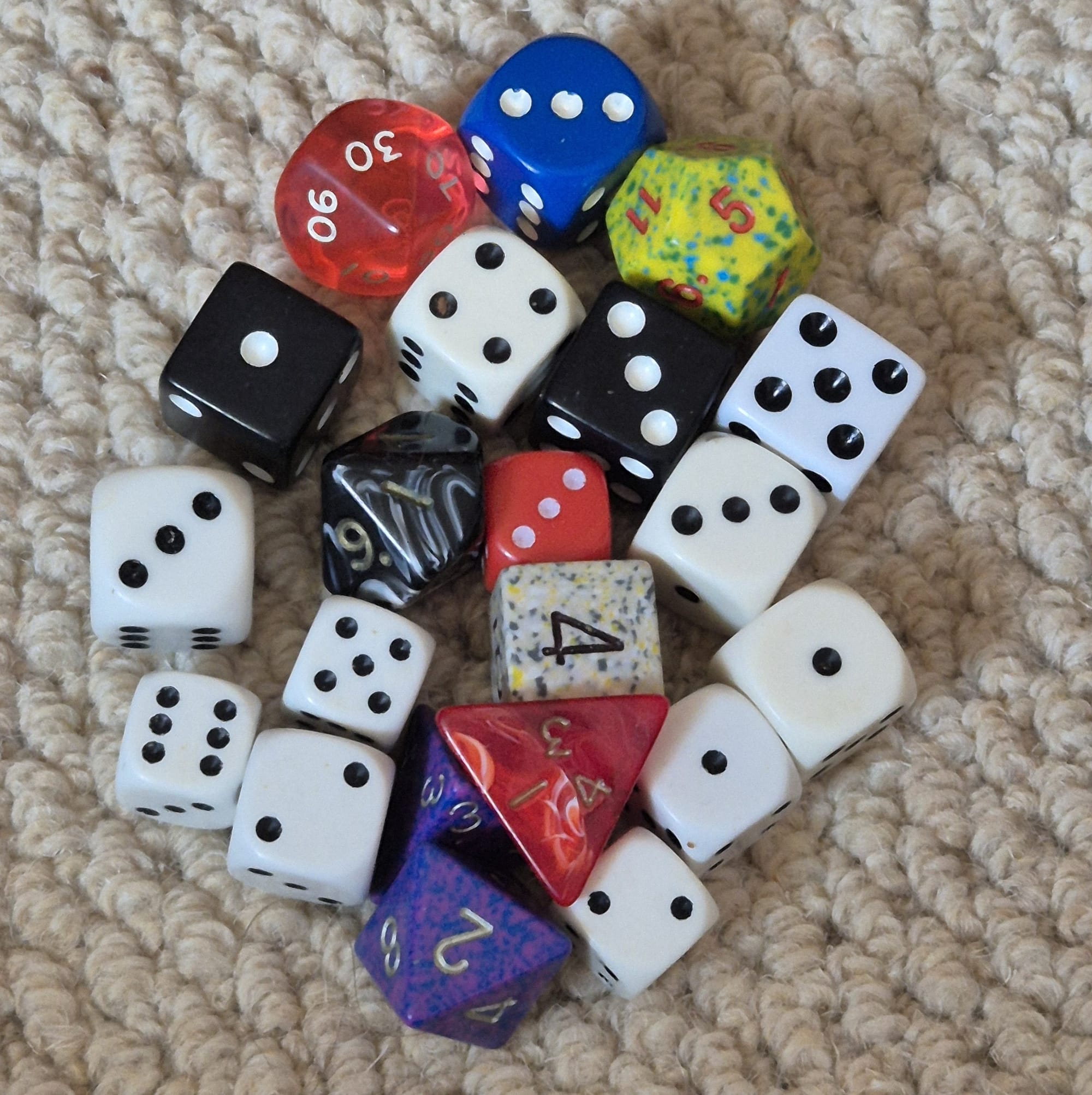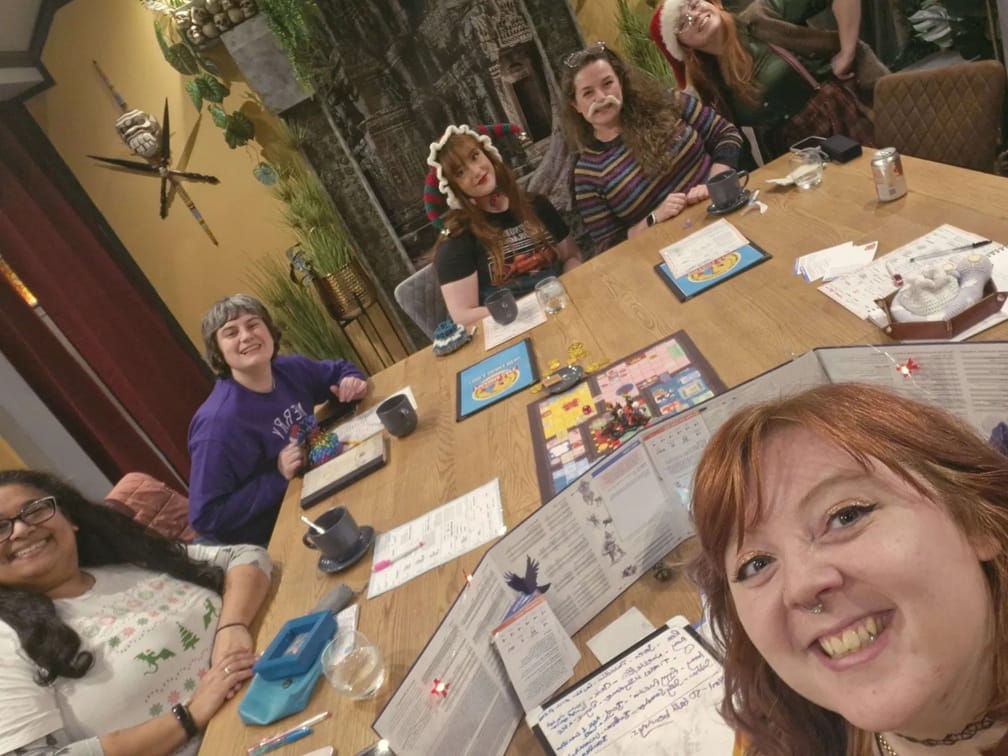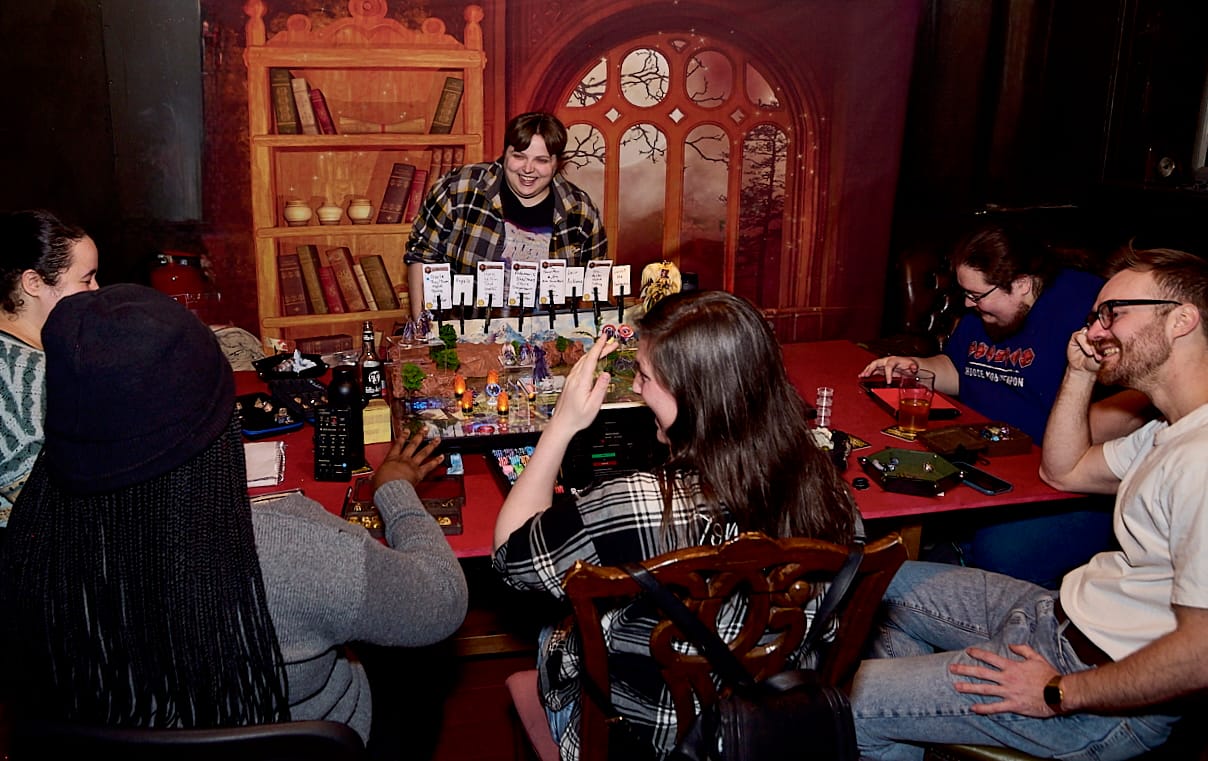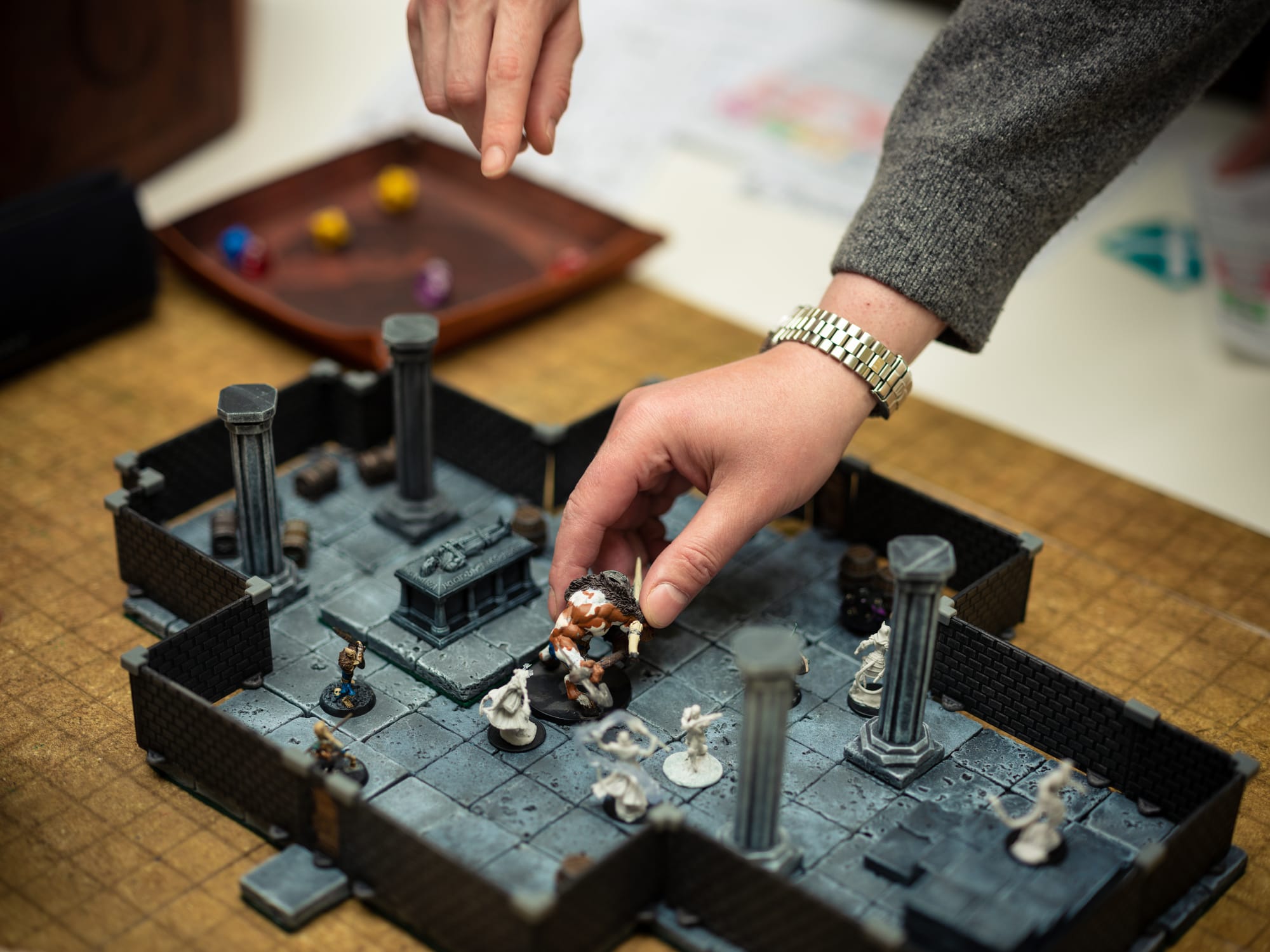TTRPGs Can Help Build Positive Communities
Exploring how TTRPGs can be used to develop friendships, bring people together, and make a real material difference

Tabletop RPG characters are constantly thrust into dangerous situations. Whether they’re vanquishing a dragon, navigating a dungeon, or dethroning a tyrant, the lives of the characters that we dream up are always fraught with risk. But that danger should always be restricted to the realms of our imagination, and everyone gathered around the table has the right to feel secure and comfortable while they play. Unfortunately, this isn’t always the case. The internet is rife with horror stories about RPGs gone wrong, from boundary-pushing players refusing to take no for an answer to game masters fueled by power fantasies enforcing their whims on an uncomfortable party.
The truism “No D&D is better than bad D&D” is often used to illustrate how harmful TTRPG groups can be at their worst. At their best, though, RPG groups can be welcoming spaces that encourage players' creativity, build up their confidence, and allow them to grow alongside their characters.
For this piece, SUPERJUMP interviewed several game masters to discuss how they ensure that they are creating safe spaces for their players, and how TTRPGs can be used to develop friendships, bring people together, and make a real material difference.
Using RPGs to Create Safe Spaces for Women

“It can be frightening to walk into something completely new. I wanted a space for female and female-presenting people to come and be with other like-minded people and to feel a sense of security.”
The county of Cornwall lies tucked away at the Southwestern edge of the UK. With the Celtic Sea to the northwest and the English Channel to the south, this windswept county of rolling fields and timeworn cliffs is exactly the sort of place where it feels like magic might happen. Those willing to search will find that Cornwall has a vibrant role-playing community lying in wait.
Cornwall’s capital, Truro, is built at the confluence of the Kenwyn and Allen Rivers that flow out into the River Fal. In the shadow of the city’s cathedral, sandwiched between a chip shop and a store that sells a mixture of plants and vintage clothes, sits the Happy Piranha Gaming Café.
Stephanie Randlesome is a game master and influencer who runs monthly “Gals & Pals” tabletop gaming nights for femme-presenting players at the café. In an interview with SUPERJUMP, she discussed her experience. “When I started playing TTRPGS, they weren’t as mainstream as they are now. Going into a space that is very male-oriented and male-run can be really intimidating. To walk into a space and feel immediately on edge is never fun. Whether that’s intended or not.”
She clarified that some of her bad experiences weren’t necessarily due to overt misogyny, but rather due to thoughtlessness: “It’s not always intentional; sometimes people just aren’t aware of other people’s experiences, and that’s something that I wanted to counter with Gals & Pals.”
Talking further about why she set up Gals & Pals, she said, “It can be frightening to walk into something completely new. I wanted a space for female and female-presenting people to come and be with other like-minded people and to feel a sense of security.”
When asked about her favourite memories with the group, she described a Christmas one-shot where her party “went feral.” Laughing, she recounted, “They didn’t do any of the dungeon, everyone just ended up flirting with each other. I could just sit back and watch these bonds form organically. It was beautiful. This group of complete strangers exchanged information, and now they’ve become a tight-knit friendship group. Seeing that happen was a magical moment.”
On 24th May, the Happy Piranha Gaming Café will be running a fund-raising evening for West Cornwall Women’s Aid. Discussing the event, Stephanie said: “I’m really excited about it. I’ve got a lovely community, and this will be a really good way of bringing them together while raising money for a good cause.”
Ensuring Safety in Massive TTRPG Groups

Now let’s move from one of the UK’s most remote regions to its bustling capital. London is plastered with pubs. They provide communal spaces to laugh and unwind in a city that can sometimes feel insular and cold. On weekday evenings and all through the weekend, RPG Taverns on Harper Road offers more than just drinks. Patrons of this adventuring site in Southwark are collectively participating in a long-running Dungeons and Dragons campaign.
This adventuring group features more than 40 Dungeon Masters and over 1000 Player Characters. With a player base of this size, the importance of ensuring that everyone is treated with dignity and respect is paramount. SUPERJUMP spoke with Sam Lawes, one of the founders of RPG Taverns, about what it takes to ensure that players in their sessions feel secure.
Sam explained that it’s about creating an environment where players feel happy to express themselves. He said, “D&D is all about being able to feel comfortable. Being able to put on a voice and act in your character. We want to give everyone a creative space so they can have a good time, without worrying that others will be judging.”
But making a judgment-free creative space is more than just a matter of having a positive mentality; it’s not something that happens without effort, commitment, and training. Sam laid out the additional safety measures his venue puts in place to ensure the comfort and security of patrons. RPG Taverns employs a robust code of conduct, as well as a wide range of safety tools such as content warnings, and the ability to pause sessions that might veer into uncomfortable territory using the X-card. As a venue that distributes drinks to both staff and Dungeon Masters, it also attains Good Night Out certification, training them to handle gender-based violence.
RPG Taverns celebrated its first anniversary on 26th April 2025. Reflecting on the community that has built up during this time, Sam stated: “It’s such a nice atmosphere walking in. There’s always smiles, and it’s lovely seeing new faces become regulars.”
Using TTRPGs for Therapy

“All humans play. Everyone plays games. Playing games is a fundamental part of our development."
Therapy can take many forms, from psychodynamic therapy, where patients talk through their pasts to uncover the unconscious patterns guiding their actions, to cognitive behavioural therapy, where activities like worksheets, diaries, and mood boards are used to chart a path toward self-improvement. But can games serve as a form of therapy? To Gary Colman, a doctor who works with the homeless and a former medical officer with the British Military, the answer is unambiguously yes.
In 2022, Doctor Colman began looking into using games to conduct therapy. He found several practitioners in the UK who had undertaken studies demonstrating that games were a “profoundly effective” therapeutic medium. Unfortunately, these studies were conducted independently, and their research was not coordinated. Doctor Colman set up Game Therapy UK to provide an umbrella organisation that could link these scattered groups together.
Game Therapy UK will be running its annual stand-up fundraiser at the Comedy Store in Leicester Square on 13th May. They will also be present at the UK Games Expo, London Comic Con, and Dragon Meet.
In an interview with SUPERJUMP, Doctor Colman discussed the research undertaken by the charity. Central to their efforts is the knowledge that “games are inherently therapeutic”. He explained, “All humans play. Everyone plays games. Playing games is a fundamental part of our development. You can make mistakes safely; if you make a mistake, you can just rewind and play it again. There are no real-world consequences when you’re playing a game.”
Games, particularly character-driven RPGs like Dungeons and Dragons, offer players the chance to introspect, experiment, and share stories in a safe space. Game Therapy UK regularly runs RPG sessions for players at risk of social isolation. These games provide support for survivors of abuse, veterans, those experiencing homelessness, and people with special educational needs, among others. Since so many of these players have experienced trauma, it’s essential that careful thought is put into the narratives of these adventures.
Doctor Colman’s primary advice to game masters who work with vulnerable players is to “play thoughtfully” and avoid employing tropes that might inadvertently reopen old wounds. Care should be used when handling story beats about addiction and violence. He says, “It’s very easy to inadvertently make a game toxic.” A careful DM can avoid these pitfalls by knowing their players: “The real skill is in the person sitting down and playing the game, having an understanding of the group that they are playing with”.
Dr Colman shared stories about what gaming therapy had been able to bring out of the groups who undertook it. An abuse survivor found controlling a muscle-bound fighter empowering, and it made her feel more able to stand up for herself. A group who had endured modern slavery reckoned with the pain of their past by creating an idyllic fantasy farming community. A group of veterans was able to “instinctively” apply their military skills to sweep every challenge facing them aside, leaving them constantly encouraging their game master to raise the stakes further and further.
Most of all, though, it’s the warmth and humanity his players feel towards one another that shows Doctor Colman that the games the charity runs are making a difference. “To see compassion being modelled by people in the group is great. Everyone is incredibly compassionate, and that is incredibly important.”
Conclusion
To return to the phrase cited in the introduction, while no D&D may be better than bad D&D, “good D&D” has so much potential to bring about positive change. Just as a toxic TTRPG group dynamic can destroy friendships, a healthy group can uplift its members and enable them to better themselves.
Creating an environment conducive to this sort of personal growth requires careful thought, consideration, and preparation. Even the most well-intentioned game masters can inadvertently discomfort their players, and even the most good-natured groups can have rough sessions. By remaining thoughtful, compassionate, and willing to learn. it’s possible to make this hobby something truly special.